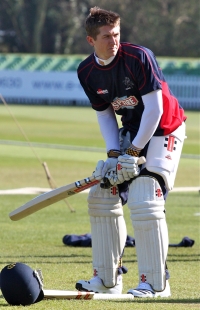Coach Mental Toughness with the 7C Approach (Part 2)

Last week we looked at mental toughness for cricket and discussed the first 3 C's: Competitiveness, confidence and control
Now let's complete the set.
Coach Mental Toughness with the 7C Approach

The most mentally tough athletes posses the "the 7 C's".
One of the regular questions that we get on the PitchVision Cricket Show concerns the development of mental skills: batting under pressure, dealing with failure and much more.
Change Your Cricket Team for the Better Without Trying too Hard
 Winning is important for every team. It's also not the only thing, and that's a problem.
Winning is important for every team. It's also not the only thing, and that's a problem.
For sides who fall somewhere below the professional level, other factors can easily take over and define you far more than the quest for victory: Jobs, family, escapism from the daily grind and so on.
These factors are real and unavoidable, but they don't have to command the side. With some simple, almost zen-like, changes to your approach, you can account for everything and still become a more professional-acting club team.
Here are some practical tip for calmly becoming more focused on winning without being ridiculed for "taking it too seriously".
Here's the Most Powerful Tool in Your Coaching Toolbox
 Coach and PitchVision Academy Columnist Sam Lavery looks at the power of words to help cricketers grow.
Coach and PitchVision Academy Columnist Sam Lavery looks at the power of words to help cricketers grow.
Can the way you speak turn players into positive "doers"?
Attention to detail in the language we use as coaches is important as we strive for perfection. Not only is what we deliver vital, but also, how we choose to deliver it.
Simply, language will help cricketers achieve what you - and they - would like.
Here's a simple example.
Use Nets to Better Grow Your Mental Toughness for Cricket
 Pressure.
Pressure.
That's the difference between a net session and a game.
In nets you can roll your arm over, or knock the ball about for 10 minutes and have some fun. Even the best managed nets lack the context of a real game. That means there is no chance for you to develop your mental toughness skills.
Which is kinda a problem. You have to teach yourself how to deal with pressure when you are under pressure.
Do a Job: How Ordinary Cricket Achieves Spectacular Success
 Picture the scene: you have just had a stellar cricket season.
Picture the scene: you have just had a stellar cricket season.
You get a trial and you do even better than you could have dreamed. Everything goes to plan and you are man of the match. Becoming a cricketer, you realise, is just a matter of time.
It's possible.
But it's also not going to happen.
You can't plan for insanely good performances at the right time. Cricket is hard, opponents are just as keen to show their potential as you. Pitches and weather are variable. You could be the next Tendulkar, Warne or Dhoni in talent, but lack the luck to show it off at the right moment.
That means you need another idea, an idea that is less about the headlines and more about a quick mention in paragraph 5 of the match report.
Because the fact is that even the most spectacular cricket heroes base their game on a consistently stronger performances than anyone else. And that comes through many small successes alongside the occasional mind-blowing performance.
Can You End Cricket Frustrations by Understanding Motivation?
 What motivates you to play cricket?
What motivates you to play cricket?
It's a question worth considering, because the reason you play will help you - and if you coach or captain, your players - to reduce the frustrations that come about when aims don't meet actions.
The Buttler Factor: How Extreme Talent Identifies Itself

In my roles with Hampshire, Somerset, Ireland and now Millfield School I have seen a significant number of talented 12 and 13 year old cricketers. There has only ever been 1 player who I predicted would play International cricket from all those promising players.
His name is Jos Buttler.
Unlock your Cricket Skill with Grit
 Grit.
Grit.
Could those 4 letters be the most powerful weapon in becoming a successful cricketer?
There is strong evidence that it's a vital trait, whatever your run-making or wicket-taking ambition. So much so that - in the coaching community - it is at least as important as technique, and far more important than talent.
How to Stay on Track After Crushing Failure
 How does it feel when you get knocked out of an important competition?
How does it feel when you get knocked out of an important competition?
Recently, a side I was coaching suffered that exact setback. We had failed to reach the primary goal we were working towards. It hurts. But the response to failure in this way will mould your future successes.
So how do you look it it?
One way is to say "one shining performance can upset even the best laid plans. After all, players are allowed to play well." You can put it behind you knowing there was nothing more you could have done. You solider on week to week through less competitive fixtures.
Maybe you go the other way. We have all had moments where we wake up at 3am with a cold sweat cursing that loose shot or dropped catch. You constantly look back at where you've gone wrong. You formulate a "what if" list that will only serve to infuriate you every time you recollect a missed opportunity.
One of these tends to be the default position.
But we can do better.

